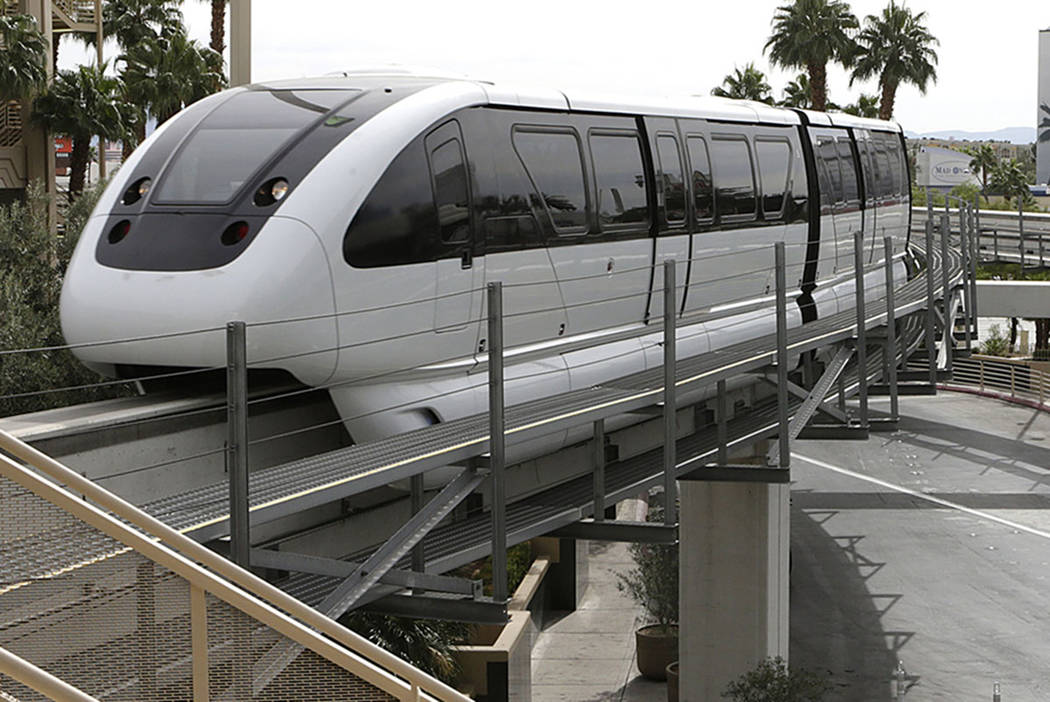COMMENTARY: Las Vegas monorail is no burden to taxpayers
In the Tuesday editorial “Governor did the right thing on LV Monorail,” the Review-Journal mischaracterizes the monorail’s current finances and our ability to secure funding to expand this important part of our transportation infrastructure.
Contrary to what was suggested, private financing to expand the Monorail has been secured pending the state’s acknowledgement of our tax-exempt status. To suggest that assurances about eager private investors are“idle talk” is simply false. Furthermore, to suggest that the state will “issue” the tax-exempt bonds is also false. These mischaracterizations incorrectly imply that the state is backing the bonds and putting state tax dollars at risk in the process.
In reaching its conclusion that this project as presented should not go forward because ridership revenues have fallen short of projections over the past several years, the editorial overlooks two critical points: The Monorail over that same time period generated annual net profits each year and the private investors have done their due diligence and believe this investment risk is worth taking.
The resort corridor faces enormous challenges as this community searches for ways to reduce near-crippling congestion at a time when much needed, large-scale projects such as the MSG Sphere, NFL stadium and Las Vegas Convention Center expansion come online. These projects, while great for Las Vegas, will put more cars on the streets and add to gridlock during large events and conventions. I applaud the Clark County Commission and the Regional Transportation Commission for acknowledging the transportation infrastructure investments that must be made in the resort corridor in order to prepare for what lies ahead. They acknowledge the role that the monorail system plays in taking cars off our streets without placing the financial burden on taxpayers.
Cities around the country have invested hundreds of millions of tax dollars to build and operate much-needed mass transit systems to address mobility and congestion. Cities — especially those with professional sports venues or convention and entertainment districts — have greatly benefited from the improved mobility and accessibility through mass transit. Las Vegas should be no different. The Monorail Co. is attempting to do the same here, only without placing the burden on local taxpayers.
According to the Federal Transit Administration’s 2017 National Transit Summary and Trends, mass transit systems on average fund only 35 percent of their operating costs, with the rest being paid by taxpayers. Our local bus system is arguably one of the most successful systems in the country, but still only achieves a 44 percent ratio. As a nonprofit private transit company, we rely solely upon the revenues generated by our operations, a fact unseen in mass transit.
The monorail has carried more than 87 million riders — riders who otherwise would have contributed to the growing congestion that constrains streets in the resort corridor. This mileage reduction translates to about 2.7 tons of emissions reductions every year. Even if you don’t ride it, the monorail reduces your drive time and improves your air quality.
With all the monorail has to offer this community, it should be portrayed as a valuable transportation asset that is not a burden on the public and our public entities.
Curtis Myles is president and chief executive officer of the Las Vegas Monorail Co.

















